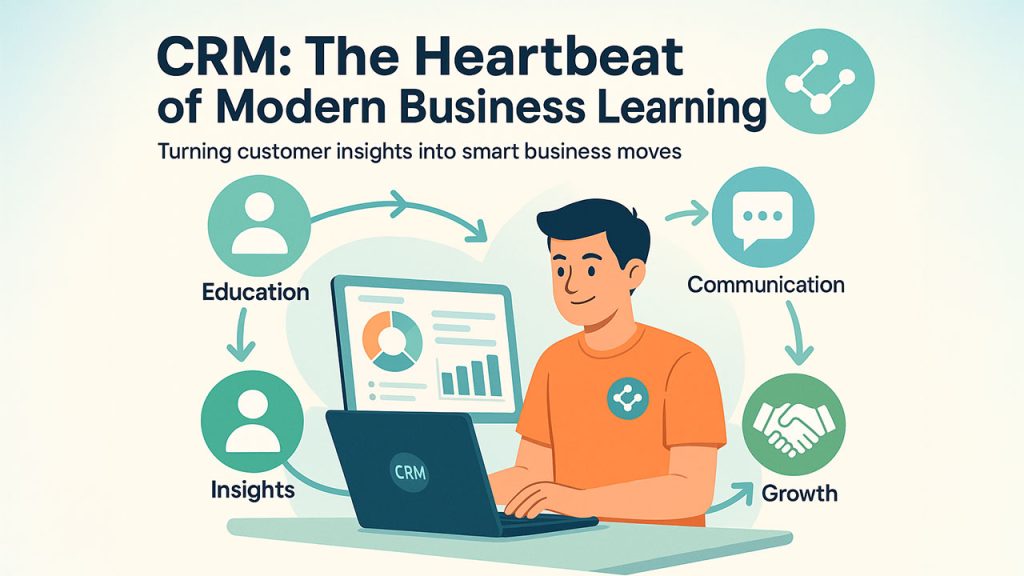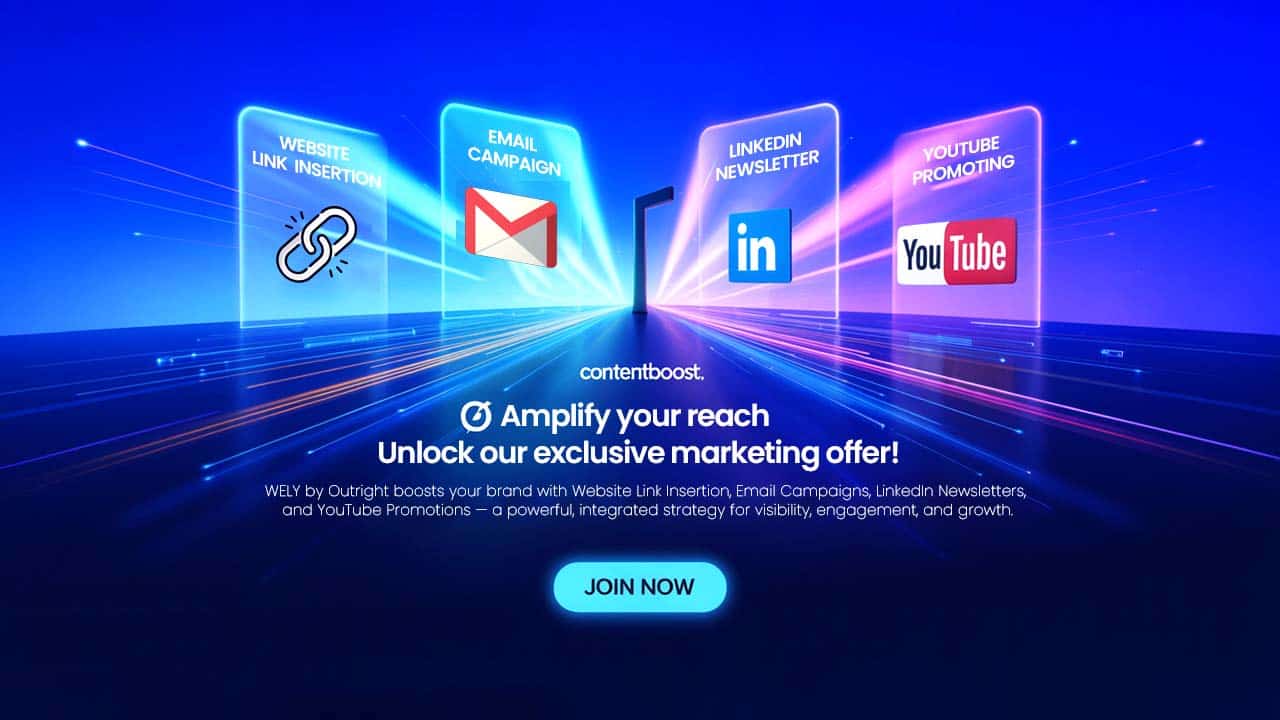In today's highly cutthroat world, knowing how businesses interact with their clients is one of the most important skills a student should have. Contemporary businesses depend on Customer Relationship Management
In today's highly cutthroat world, knowing how businesses interact with their clients is one of the most important skills a student should have. Contemporary businesses depend on Customer Relationship Management (CRM) systems and digital outreach strategies to establish trust, enhance engagement, and make meaningful decisions.
Whether you’re a business owner or business student, gaining expertise in these learning tools is more crucial than ever before. These skills will help you understand how people and data are interconnected, increase conversion ratesand manage customer relationships. CRM systems are crucial to managing clients professionally, while marketing helps attract, engage, and retain customers. Together, they build the foundation of long-term business success and growth.
Certainly, maintaining educational reliability while cultivating these skills is important. That's why many students and experts leverage digital tools like EssayPro to execute their work via a trustworthy plagiarism checker before submission. It preserves authenticity while maintaining academic writing standards; both factors are important in professional and literature contexts. These tools motivate students to develop accountability and skills in creating real work.
The Role CRM plays in Business Education

CRM is more than just a sales tool; it drives key strategies that foster modern business growth. Mastering CRM helps students learn how businesses manage customer data, track leads, and analyze behavior effectively.
For instance, you booked a hotel online and instantly got a personalized email about a product you recently viewed. It’s not magic; a CRM system is quietly working in the background. It gathers and analyzes data to deliver a great customer experience.
In an academic environment, CRM policies help students learn to:
- Strengthen loyalty through personalization and timely follow-ups.
- Recognize and tailor customer requirements.
- Enhance cross-functional communication between departments.
- Understand consumer behavior and data insights.
These approaches aren't just suitable for big organizations—they're also effective for small businesses, startups, and nonprofits. Mastering CRM basics is beneficial for students to become agile professionals seeking to thrive across industries.
The Intersection Between CRM and Marketing Tools
Marketing is not about guesswork anymore. CRM systems enable enterprises to make data-driven and informed marketing decisions. When students fully internalize both, they get insight into how companies manage, plan, execute, and measure campaigns efficiently.
Let’s look at how marketing is supported by CRM:
- Customer Categorization: Segment audience into groups based on their interests, geography, or purchase patterns.
- Targeted campaigns: Identifying the right customers and sending the right message at the right time.
- Monitoring Performance: Tracking and keeping records of campaigns that drive the most engagement.
- Retention analysis: Identifying those patterns that motivate repeat purchases.
A renowned expert writer from EssayPro's essay writing service, Annie Lambert would say, "When students see how marketing and CRM complement each other, they start thinking like strategists - connecting creative ideas to measurable outcomes.”
CRM as a Essential Tool for Students
Students who have a solid understanding of CRM software stand out in today’s competitive job market. Businesses need experts who have the required skills to leverage technology to enhance operations and customer satisfaction.
Many of the most trending, popular CRM platforms now include HubSpot, Salesforce, Microsoft Dynamics, and Zoho CRM. Although a basic knowledge of how these platforms function can offer advancement in the following fields.
- Outreaching and advertising
- Sales and customer management
- Client success and support
- Business intelligence
CRM expertise empowers students to strengthen all core competencies, like analytical thinking, collaboration, and communication.
The Marketing Synergy: Blending Data with Creativity
The right marketing platforms are the ones that combine creativity with analytics. For students who work on data interpretation through CRM with storytelling from marketing, they have a clear benefit.
Studying CRM and marketing together helps students develop numerous skills, including
- Analytical thinking: Comprehending client data and analytics.
- Innovative problem-solving: Crafting campaigns that engage emotionally.
- Digital literacy: Understanding online platforms and evaluation tools.
- Thoughtful planning: Conducting thorough research to guide decisions.
Imagine a student is instructed to promote a small cafe by using CRM software to monitor customer interest while implementing marketing skills to craft personalized email campaigns or social media advertisements.
CRM Role in Real Business Scenarios
Students can engage with real-world success stories to better understand the power of CRM.
- Starbucks utilizes its loyalty application to monitor customer purchases and suggest products.
- Amazon depends on CRM analytics for tailored recommendations.
- Airbnb leverages CRM to improve customer service by reviewing feedback from hosts and guests.
These illustrations highlight that CRM is more than a technical platform—it's a philosophy of customer relationships. It redefines how companies listen, scale, and offer personalized experiences.
Especially for business and management students, learning how CRM redefines client relationships is crucial. It explains how technology can improve human connection—a meaningful insight for aspiring leaders.
Combining CRM Expertise Into the Classroom
Educators can integrate CRM into assignments, case studies, and practice exercises to make learning more natural. Many universities are increasingly adopting various free or trial versions of famous CRM systems to give students practical experience.
Here are different ways to incorporate CRM tools in class:
- Instruct students to draft a customer marketing plan through CRM data.
- Observe the CRM tools of a real organization and understand the marketing strategy.
- Ask students to demonstrate how CRM tools help startups grow and expand operations.
These exercises not only improve digital proficiency but also give students hands-on experience that employers notice.
The Role of Continuous Learning in Business
Business and marketing evolve constantly. New technologies appear, consumer behavior shifts, and strategies that worked yesterday may not work tomorrow. That's why students must view learning as an ongoing process.
CRM systems often update with new features. Marketing platforms change algorithms. That’s why curiosity, flexibility, and proactiveness are crucial factors for professionals seeking to thrive in today’s digital-first landscape.
Below are the ways for students to develop these qualities by:
- Analyzing case studies on sophisticated marketing strategies.
- Engaging with industry leaders in CRM and digital transformation.
- Attending online workshops and earning certifications.
- Upholding transparency by leveraging tools like plagiarism checkers for all written works.
This synergy of curiosity and morality establishes the foundation for a thriving, reliable business career.
Last Verdict: Developing Integrity and Innovation Together
Whether you’re a student seeking to build a career in entrepreneurship, marketing, and management, comprehending CRM is no longer optional; it’s becoming a necessity. It teaches how to analyze, empathize, and innovate all at once.
Yet just as important as skill development is character development. Using ethical tools such as the EssayPro plagiarism checker shows students that integrity and professionalism go hand in hand.
Mastering CRM systems helps future business leaders understand their customers. Additionally, they’ll boost their trust with honesty, integrity, and reliability. Finally, the synergy of data and ethics defines how to succeed in business and in life.
Respond to this article with emojis






